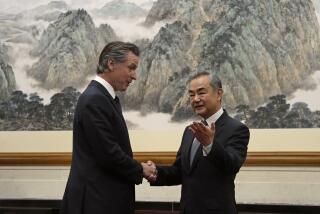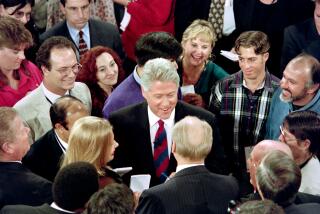Hong Kong Trade Official’s Job Getting More Complicated : Pacific Rim: With takeover by China right around the corner, commerce is taking a back seat to political issues.
- Share via
On the first day of a recent swing through Southern California to promote Hong Kong’s economic development, Peter Johnson met state Sen. Edward Royce in Orange County and was hit with hard questions on why the British crown colony was repatriating Vietnamese boat people.
In Glendale the next day, over pancakes at Du Par’s with state Sen. Newton Russell, the first question involved Hong Kong’s “slow process” toward free elections and how residents were currently able to affect the political process.
Later that morning, at a meeting with business professors at Loyola Marymount University, the Hong Kong economic official tackled the ubiquitous question of the “brain drain”--the tens of thousands of mostly white-collar managers who are fleeing the colony in fear of China’s 1997 takeover.
And in Beverly Hills for lunch, Los Angeles Business Council President Dorie Pye asked if he worked for the British (the answer is no) and then bluntly told him: “I’m hearing of people moving out and moving funds out of Hong Kong.”
Peter Eric Johnson, director of the Hong Kong Economic & Trade Office in San Francisco, doesn’t exactly have an easy job these days.
He is supposed to promote the economic interests of Hong Kong, a dense maze of neon signs, breathtaking skyscrapers, electrifying energy and nearly 6 million people stuffed in an area smaller than Los Angeles proper who arguably are the purest capitalists in the world.
But instead of extolling Hong Kong’s wide open trade and low taxes, its prospering port and new airport plans; instead of boasting about its status as 10th largest trading economy and its 8.3% annual growth for the past decade, Johnson more often than not finds himself talking politics, politics, politics.
“I have less contact with business people than I would like. In normal times, we’d like to spend more time on economic and trade matters,” said Johnson, 52, who arrived from Hong Kong in 1988 to head the San Francisco trade office. “The fundamental point I have to get across is that Hong Kong has a credible future as a regional economic center.
“But it is crowded out to some extent talking about 1997 and Vietnamese boat people and other issues. It’s the first hurdle. I have to get over these issues before I can talk about other things.”
And so, day after day, in meeting after meeting, the Britain-born, Oxford-educated bureaucrat does just that.
The brain drain? “It’s probably our single largest concern, our single largest worry. It is an inconvenience and something of an expense,” Johnson said not once but three times, with slight variations, on a recent day.
For the past two years, as many as 45,000 people annually have emigrated from Hong Kong--mostly to Canada, Australia and the United States--and Johnson said he expects 55,000 more to leave this year. The exodus of so many of Hong Kong’s best and brightest, taking their education, skills and investment dollars away, has left a critical vacuum of managerial talent on which the colony’s future depends.
“We expect to see this continue, to be perfectly honest, for the next two or three years,” he told Russell with characteristic candor.
He was also inevitably peppered with questions about legal and political guarantees in what is known as the “basic law,” the governing agreement after the Chinese regain sovereignty in 1997. That 50-year agreement covers Hong Kong’s transition to limited free elections, guarantees an independent judiciary and insures a continuation of its determinedly free trade, among other things.
“If the basic law is implemented as it stands, there will be no problems,” he said. Although some believe that China’s June 4 attack on students in Tian An Men Square reduced the basic law to a worthless piece of paper, Johnson said: “Any wholesale junking of the agreement is unlikely. The basic law could be better. We could have more and quicker progress on the move toward free elections. But if I were to sum up my view, I would say I’m cautiously optimistic.”
In Orange County, Royce and state Sen. John Seymour hammered on the question of why Hong Kong was sending boat people who didn’t qualify as refugees back to Vietnam. It’s a question the rest of the world is asking, too, and Johnson showed his frustration. Especially since Royce referred to the boat people as “our allies,” even though Johnson tried to explain that 80% of those streaming to Hong Kong today are from northern Vietnam and thus barred by the United States for resettlement in America.
“No matter how many times I tried to insert that, he didn’t want it to register. This is perhaps symptomatic of American politics. They take what people tell them and reflect it without filtering it,” Johnson said.
“If you’re thinking about Hong Kong and its long-term future and the issues that confront us in terms of building our airport, in the context of the broader issues, the Vietnamese boat people are a sideshow,” he said.
Eventually, Johnson did manage to get his point across that California and Hong Kong share synergistic economic futures. California is involved in fully one-third of Hong Kong’s $24 billion in trade a year. In 1988, Hong Kong purchased $1.1 billion of California goods, up 21% over 1987, mostly electronic equipment, machinery and agriculture. In return, Hong Kong sent $3.6 billion worth of apparel, electronic goods, rubber and office equipment through California ports in 1988, a big jump from $1.7 billion in 1987.
So important is Hong Kong trade to California that the state recently selected that spot over Singapore, Seoul, Bangkok and Taipei to open its second Asia trade and investment office. Despite fear about 1997, several California companies have decided to base their Asian headquarters in Hong Kong, including Walt Disney Co., Bank of America and McDonnell Douglas.
A California firm, Bechtel Group, also successfully bid for the job of project management for the first phase of Hong Kong’s $16-billion airport and port development. And a Pasadena-based engineering firm, RMP Encon Group, is one of the three finalists to draw up a master plan for the project.
As opposed to the thicket of invisible barriers U.S. firms complain about in Japan, “Hong Kong is a completely level playing field,” Johnson said.
The bearded bureaucrat is responsible for 19 Western states and British Columbia and likens his job to “a 19th-Century vicar wandering around visiting my parishioners.” The constant travel takes him away from his wife and two children, his tennis lessons and one of his life’s passions: the trumpet. He joined a band but has missed most of the Tuesday practices because he is on the road.
Since the Tian An Men Square massacre, Johnson said his job has become both easier and more difficult. Easier, because now he is in demand as a speaker. More difficult, because of the host of questions that have come up regarding Hong Kong’s political future.
Ultimately, it’s a question that Johnson, for all his 23 years of Hong Kong government experience, can’t answer.
“What can be done in the long-term is a matter for authorities in Beijing,” he said. “You can’t restore confidence by command.”
More to Read
Inside the business of entertainment
The Wide Shot brings you news, analysis and insights on everything from streaming wars to production — and what it all means for the future.
You may occasionally receive promotional content from the Los Angeles Times.











